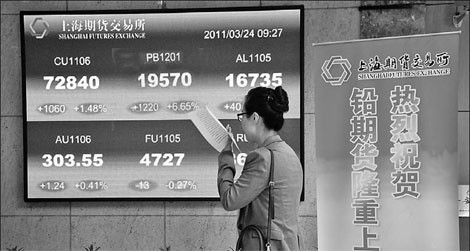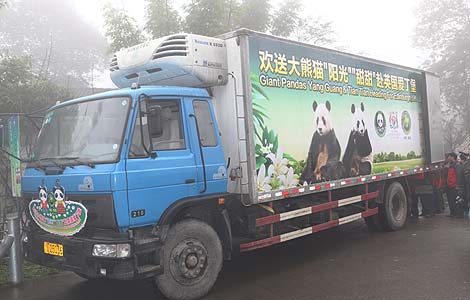Exchange looks to add foreign members
Updated: 2011-12-07 07:52
By Gao Changxin (China Daily)
|
|||||||||
|
A screen displays data about futures transactions at the Shanghai Futures Exchange. The exchange's trading volume fell by 52 percent to 281.95 million lots in the first 11 months of the year. Jin Rong / For China Daily |
SHANGHAI - Analysts and investors welcomed the Shanghai Futures Exchange's plan to accept foreign traders as its members, saying the change will invigorate trading and increase the exchange's pricing power.
On Tuesday, an exchange official confirmed a Bloomberg report that said the organization is trying to broaden its membership in a bid to boost its trading volume, which has plummeted by more than half this year. The change comes partly in response to aggressive competition from overseas exchanges.
Bloomberg quoted Yang Maijun, general manager of the Shanghai Futures Exchange, as saying the exchange is trying to find the best way to allow banks, trusts, securities and fund companies to enter the commodities markets. Its goal in doing so is to expand the market in the next five years.
"We have long wanted to become a trading member in the exchange," said Andrew Wang, China head of the precious metals division at South Africa-based Standard Bank Group Ltd.
"That will help us reduce trading fees and risks and further grow our commodities business here in China."
Standard Bank maintains a large business in the trade of spot commodities in China, doing deals for 100,000 tons of copper and aluminum in 2010. Still, it does little in China's futures market because trading with brokers there poses too many contractual risks and comes with higher trading fees.
The bank is now applying to trade silver futures with the exchange, Wang said. Silver trading became much more common in China this year, a result in part of investors taking their money out of the sluggishly performing stock and property markets.
Wells Fargo & Co, the fourth-largest bank in the United States measured by its assets, said its business in China has mainly had to do with trade settlements and that it has no immediate intention to apply for membership in the Shanghai Futures Exchange. Even so, the bank said the exchange's decision opens new business opportunities in China.
Wang said the country will not achieve its goal unless it allows more foreign investors to participate in the futures market.
"If foreign investors are not even allowed to trade directly with the exchange, there is no way the prices set here will be regarded as any form of a benchmark," Wang said.
The Shanghai Futures Exchange has 400 members, most of which are futures brokerages. This year, the exchange decided to allow gold trading to be undertaken by the local units of Australia and New Zealand Banking Group Ltd and HSBC Holdings PLC.
That change came after the exchange's trading volume fell by 52 percent to 281.95 million lots in the first 11 months of this year. In 2010, the volume had risen by 43 percent, hitting 621.90 million lots, according to the China Futures Association. Helping to tamp the volume down have been tightened lending requirements, a government crackdown on speculation and competition from foreign exchanges.
The Chicago-based exchange CME Group Inc is in talks with the China Securities Regulatory Commission to allow Chinese futures brokerages to trade on it. And the London Metal Exchange held training sessions in China last month after introducing mini-contracts for copper, aluminum and zinc that will be settled in cash with the Singapore Exchange in February.
China Daily
(China Daily 12/07/2011 page14)












